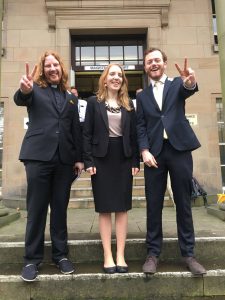-
Sam Walton and Rev. Daniel Woodhouse have been acquitted after breaking-in to BAE Systems factory to “disarm” Typhoon fighter jets.
- BAE’s Typhoon fighter jets are being used by Saudi-led forces in the ongoing bombardment of Yemen
- The UK has licensed £3.8 billion worth of arms to Saudi Arabia since the bombing began in March 2015
- £2.6 billion worth of ML10 licences (Aircraft, helicopters, drones)
- £1.1 billion worth of ML4 licences (Grenades, bombs, missiles, countermeasures)
- £572,000 worth of ML6 licences (Armoured vehicles, tanks)
Section 5 Criminal Damage Act 1971 5 “Without lawful excuse.”
(1)This section applies to any offence under section 1(1) above and any offence under section 2 or 3 above other than one involving a threat by the person charged to destroy or damage property in a way which he knows is likely to endanger the life of another or involving an intent by the person charged to use or cause or permit the use of something in his custody or under his control so to destroy or damage property.
(2)A person charged with an offence to which this section applies, shall, whether or not he would be treated for the purposes of this Act as having a lawful excuse apart from this subsection, be treated for those purposes as having a lawful excuse—
(a)if at the time of the act or acts alleged to constitute the offence he believed that the person or persons whom he believed to be entitled to consent to the destruction of or damage to the property in question had so consented, or would have so consented to it if he or they had known of the destruction or damage and its circumstances; or
(b)if he destroyed or damaged or threatened to destroy or damage the property in question or, in the case of a charge of an offence under section 3 above, intended to use or cause or permit the use of something to destroy or damage it, in order to protect property belonging to himself or another or a right or interest in property which was or which he believed to be vested in himself or another, and at the time of the act or acts alleged to constitute the offence he believed—
(i)that the property, right or interest was in immediate need of protection; and
(ii)that the means of protection adopted or proposed to be adopted were or would be reasonable having regard to all the circumstances.
(3)For the purposes of this section it is immaterial whether a belief is justified or not if it is honestly held.
(4)For the purposes of subsection (2) above a right or interest in property includes any right or privilege in or over land, whether created by grant, licence or otherwise.
(5)This section shall not be construed as casting doubt on any defence recognised by law as a defence to criminal charges.

